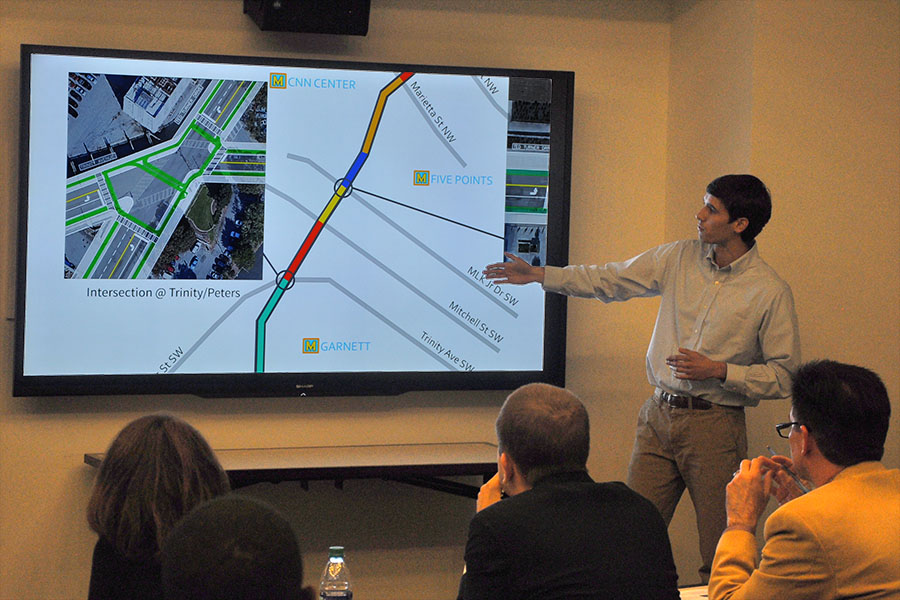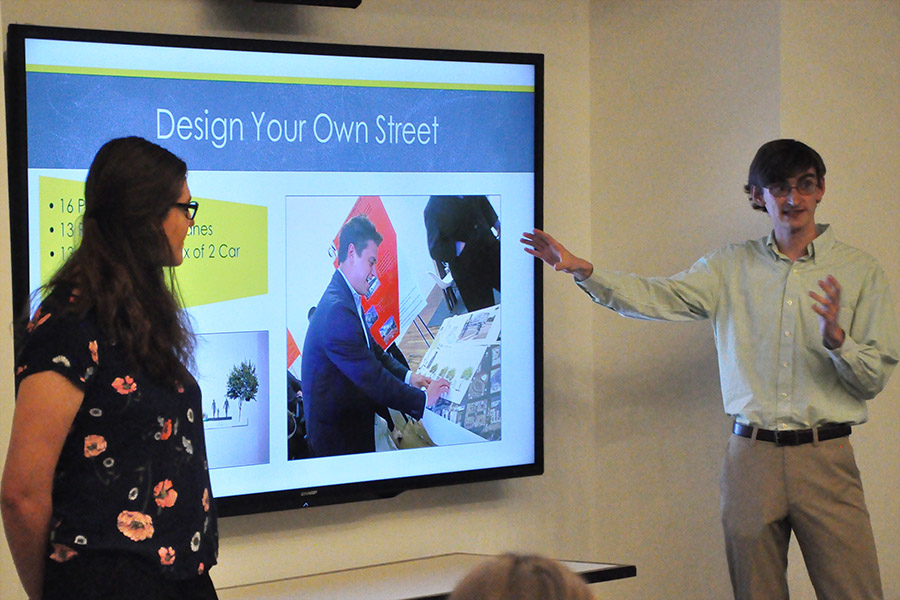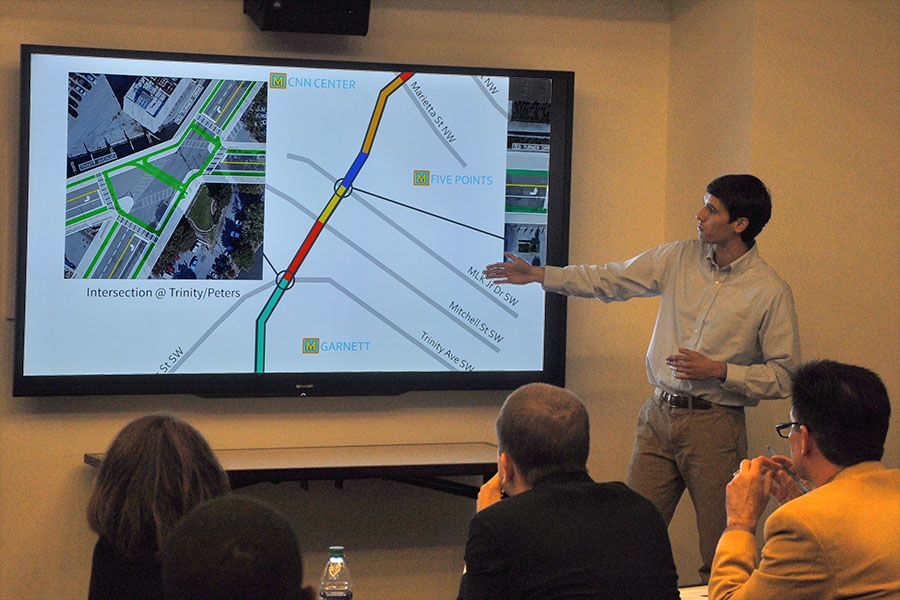 Andrew Pofahl explains to judges some of the design ideas the Delft Blauw Design team proposed for Ted Turner Drive in downtown Atlanta. Two teams of Georgia Tech students offered redesigns of the road for the Ted Turner Drive Resiliency Corridor Challenge, adding green space, bike lanes, and public art. Delft Blauw Designs won second place in the competition. (Photo: Joshua Stewart) |
In a few years, Ted Turner Drive in downtown Atlanta may well owe some of its reimagined design to a School of Civil and Environmental Engineering class trip to the Netherlands.
Two groups of students who made that journey returned with new ideas about sustainability and community infrastructure. They infused those ideas into suggestions for remaking the Ted Turner Drive corridor and presented them to city officials and community advocates in late April as part of a design challenge orchestrated by the city’s Renew Atlanta bond program.
Their ideas included more greenspace, fewer lanes for cars, dedicated space for walking and biking, and even new art installations.
“Dutch infrastructure creates a space where there are people. I hope that [Ted Turner Drive becomes] a space people are using — people who want walk and people who want to bike can use it, but also people who want to drive can still use it,” said Andrew Pofahl, a member of the Delft Blauw Design group that won second prize in the final design competition May 2.
Pofahl said the trip to the Netherlands with the global engineering leadership minor-affiliated Sustainable Transportation Abroad class opened his eyes to making space in a corridor like Ted Turner for all potential users.
“That was one of the biggest things in the Netherlands: They’re very multi-modal and they prioritize all of their modes. If you’re in a car, it’s pretty easy to drive a car if you want to. It’s also easy to ride a bike; it’s easy to walk around.”
Anna Peterson was a member of the other Tech design team, Dare to Delft — Delft was the city that served as students’ home base in the Netherlands — and she expressed the same sentiment for the corridor.
“I would like to see Ted Turner be a place where people want to be instead of a place where they have to be,” she said. “I want them to want to walk the corridor and spend time out of their vehicles and enjoy the space.”
 Jack Glodek, right, and Anna Peterson tell judges at the Ted Turner Drive Resiliency Corridor Challenge about their community engagement event where they used a game to ask people how they would balance cars, bikes, pedestrians, green space and parking along the roadway in downtown Atlanta. The city wants to turn the drive into a gateway for downtown Atlanta that showcases sustainability, equity, social cohesion and mobility. (Photo: Joshua Stewart) |
For both groups, accomplishing that goal included bike lanes and wider sidewalks. They proposed slimming the four-lane, one-way road down to two lanes with traffic flowing in both directions and maybe a center turn lane. They want to add new stormwater systems that also separate people, bikes and cars while adding trees. They suggested new public art drawing on the area’s history. And they advocated for more green space — lots more green space — for an area now covered in concrete.
“In order to help with stormwater mitigation and create public gathering spaces, we wanted to focus on de-paving parking lots and bringing green space to those areas,” said Sara Douglass, a master’s student and member of the Delft Blauw group.
|
DELFT BLAUW TEAM
|
DARE TO DELFT TEAM
|
In developing their designs, the groups met with residents around the corridor and collected feedback. Jack Glodek’s Dare to Delft group created a game where residents designed their vision of the ideal road cross-section, incorporating what each person saw as the ideal balance of road, bike path, sidewalk, parking and trees.
“My favorite part was our community engagement event,” Glodek said. “People came over and instead of us talking to them, we told them, just play this game. I think the most beneficial thing for me was figuring out ways of talking to people about ideas, ‘cause through the game we presented these ideas — bike lanes, buffers between modes — and I think it was much more effective to do it through a game and through some sort of presentation.”
The Ted Turner Drive Resiliency Corridor Challenge grew out of Atlanta’s city-wide resilience strategy and a desire to make the road a gateway to downtown. The competition included the two teams from Tech as well as students from the University of Georgia, Morehouse College and Clark Atlanta University. City officials said they will use the winning proposal as the starting point for their eventual redesign, using some or all of the ideas.
Glodek’s teammate Re’Nisha Clayton said she knows some of the Dutch-inspired ideas the groups presented push the envelope. But she hopes that pushes the city to think in new ways.
“It was challenging to get out of the mindset of saying, ‘It can’t happen in America.’ The attitude is very different over in the Netherlands versus in America. So first we just had to get out of that mindset of ‘it can’t happen’ and find a way to say, ‘It will, or we’ll make it happen another way.’”

